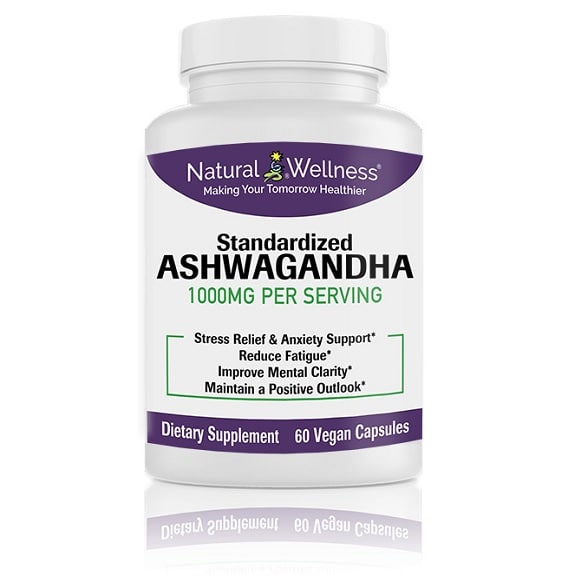While research on ashwagandha has been shown to reduce anxiety levels – find out just how quickly it can help with this uneasy feeling of fear and dread.
We all experience anxiousness from time to time, such as when running late for a meeting or when waiting to hear the results of a medical test. However, for almost one in five adult Americans and roughly 7% of children and teens, an anxiety disorder is responsible for constant and sometimes intense feelings of apprehension, restlessness, or sense of dread that can accompany these mental health conditions. (1) If anxiety feels like it’s taking control of your life, ashwagandha may help. Find out how long it takes ashwagandha to work for anxiety.
What Is Ashwagandha?
Ashwagandha, also known as Indian ginseng or Indian winter cherry, is an herb that has been used for thousands of years in traditional Ayurvedic and Chinese medicine. (2) It comes from a shrub native to Africa, India, and some areas of the Middle East.

It contains numerous bioactive compounds known to have a variety of medicinal properties. Some of these properties have been found to be beneficial for easing anxiety.
Research Involving Ashwagandha and Anxiety
A piece of research published in the journal Phytotherapy Research analyzed 12 different studies that each sought to understand the effects of ashwagandha on anxiety and stress. In total, they included 1,002 participants. Based on this analysis, researchers noted that when compared to a placebo, taking an ashwagandha supplement “significantly reduced anxiety” for the subjects in the intervention groups, also lowering their stress levels. (3)
Sometimes anxiety co-occurs with other mental health disorders. Ashwagandha may provide benefits in these cases as well. For instance, one study found that this herb helped reduce both anxiety and depression symptoms in people with schizophrenia—and it did so with only mild adverse effects. (4)
One of the bioactive compounds in ashwagandha that appears to help reduce anxiety is withanolides. They have been reported to help treat acute stress-induced anxiety. (5) This type of anxiety occurs shortly after experiencing some type of trauma or traumatic event. Other active compounds in ashwagandha include many different alkaloids and flavonoids.
When anxiety strikes, it’s normal to want to find relief as quickly as possible. But how long does it take for anxiety to reduce after taking an ashwagandha supplement?
Based on published research studies, individuals taking ashwagandha often reported beneficial effects within six to eight weeks. (6) So, this herbal remedy may be better for helping reduce longer bouts of anxiety versus being a quick-acting option.
It should also be noted that there is no one-size-fits-all response to herbal remedies such as ashwagandha. In other words, you may react to these substances in a different time frame than someone else. They may also not provide the results you desire. This makes it somewhat difficult to determine exactly how quickly ashwagandha may work for you or if another substance or treatment may be more effective.
9 Other Ashwagandha Benefits
Ashwagandha’s potential health benefits extend beyond those associated with lower anxiety and stress levels.
Research has also connected it with: (6)
- offering protection from neurological conditions such as Alzheimer’s disease, Parkinsons, and Huntington’s disease
- helping to treat obsessive-compulsive disorder (OCD) and alcohol withdrawal syndrome
- reducing inflammation in the body, possibly making it helpful in the treatment of cardiovascular, pulmonary, and autoimmune diseases
- aiding in the treatment of drug-resistance infections, thanks to its antibacterial properties
- helping to treat infertility by increasing sperm count and motility, also increasing semen volume
- having anti-cancer properties, protecting against cancers of the breast, colon, lungs, prostate, and blood
- being an anti-diabetic by lowering blood glucose levels, also positively impacting cholesterol levels
- helping treat sleep disorders by improving sleep quality, along with making it easier to fall asleep
- treating less-advanced hypothyroidism by stimulating thyroid activity and normalizing thyroid gland function
Additional Ways to Ease Anxiety
While taking ashwagandha may help reduce anxiety, it isn’t the only option you have for reducing your feelings of anxiousness. Other ways to lower anxiety levels include getting regular physical activity, writing in a journal, meditating, and doing deep breathing exercises. (7)
If you try different anxiety-relieving techniques such as these and nothing seems to work, it’s important to seek professional help. You may have an anxiety disorder that would benefit from medication, some type of psychotherapy, or a combination of the two.
 And if you’re interested in taking this ancient medicinal herb, Natural Wellness offers an Ashwagandha supplement.
And if you’re interested in taking this ancient medicinal herb, Natural Wellness offers an Ashwagandha supplement.




